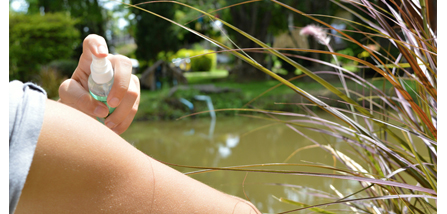By Heidi J. Weinroth, MD
Cooper Pediatrics at Moorestown
 Even though summer is officially drawing to a close, concerns about mosquito-borne illnesses linger as long as the weather remains warm. With athletes and spectators returning from the summer Olympics in Rio, there is also worry about the spread of the Zika virus and the effects it can have on women who are thinking about becoming pregnant or who are already pregnant. I thought it would be helpful to review some strategies for preventing mosquito bites in the first place.
Even though summer is officially drawing to a close, concerns about mosquito-borne illnesses linger as long as the weather remains warm. With athletes and spectators returning from the summer Olympics in Rio, there is also worry about the spread of the Zika virus and the effects it can have on women who are thinking about becoming pregnant or who are already pregnant. I thought it would be helpful to review some strategies for preventing mosquito bites in the first place.
Protective Clothing
Wearing long sleeves and long pants tucked into your socks can keep your skin protected from bites. Mosquitoes like areas with high carbon monoxide levels, such as near the face, so wearing a hat with some protective netting can also be a good strategy for prevention. Baby strollers can be covered with netting as can outdoor sleeping areas. Clothing and camping gear can be pretreated with Permethrin to provide prolonged protection that even lasts through several washings.
Sprays
The CDC recommends the following ingredients to be safe for protection from mosquitoes. When using these products on children, please note that no repellents should be used on babies under 2 months of age and that some should not be used on children under 3 years old. Children should not touch repellents and they should not be sprayed on their hands. Also, the EPA has recently introduced new labelling on repellent products. These easy-to-read graphics will help users identify the repellency time for both mosquitoes and ticks.
DEET is one of the most effective repellents available. Sprays come in many different concentrations to help protect you for more prolonged exposure times. Products containing less than 10 percent DEET provide only one to two hours of protection (they are not to be used on infants under 2 months of age). The CDC therefore recommends 20 percent or more DEET for prolonged exposures. According to Consumer Reports, the most effective DEET-containing spray they tested was Ben’s 30 percent DEET Tick and Insect Wilderness Formula.
A more natural alternative to DEET-containing sprays are ones that contain lemon eucalyptus. Consumer Reports did testing and reported Repel Lemon Eucalyptus to be one of the most effective sprays. Lemon Eucalyptus is not to be used on children under 3 years of age.
Another product tested by Consumer Reports was Sawyer Picardin. Picardin at a concentration of 20 percent was found to repel mosquitoes for up to eight hours. All of these products can irritate a child’s eyes or open skin sores, so read the instructions carefully.
Remember to wash off your skin with soap and water once indoors. While it may be convenient to use a combination product containing sunscreen and insect repellent, it is not recommended. Sunscreen needs to be reapplied more often than insect repellents to be effective. Sunscreen should be applied first to the skin and left to dry before applying repellent.
Dr. Heidi Weinroth is a pediatrician at Cooper Pediatrics in Moorestown.
To learn more about Dr. Weinroth, please visit her profile here.
To learn more about Cooper’s pediatric services and to make an appointment, please visit our Cooper Pediatric Practices page.
